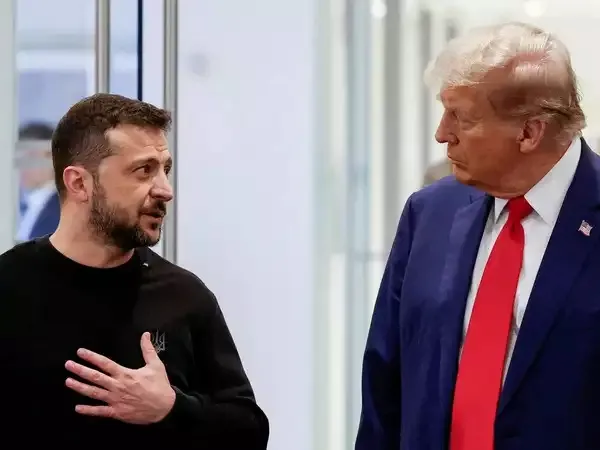Trump’s Peace Plan for Ukraine: A Shift in Priorities that Stuns Allies
Donald Trump’s proposal to negotiate peace with Russia has created a stir in Europe and left Ukraine feeling isolated. What does this mean for the war's future?

Introduction
As the war in Ukraine enters its third year, the international community is grappling with shifting alliances and emerging peace proposals. U.S. President Donald Trump has stirred controversy with a new peace plan for Ukraine, calling for negotiations with Russian President Vladimir Putin. However, Ukraine’s President Volodymyr Zelensky has rejected Trump's proposal, demanding that any deal be linked to security guarantees for Ukraine. This unexpected development has sent shockwaves through European capitals, leaving them scrambling for options while raising doubts about the future of U.S. support for Ukraine.
The Dilemma for Ukraine
Ukraine’s military, already under immense pressure from relentless Russian attacks, is facing low morale and a rising number of desertions. Ukrainian soldiers, who have sacrificed so much, are now questioning whether the U.S. is prepared to hand over key concessions to Russia after years of bloody conflict. The Ukrainian president has set clear conditions for any peace negotiations with Russia, insisting that the U.S. and Europe must be on board before any talks can take place.
Zelensky's decision to reject Trump’s offer has left Ukraine feeling isolated, with its president forced to bargain hard to regain all territory seized by Russia. Despite these challenges, Zelensky has emphasized the importance of Ukraine's sovereignty and the need for Western support to secure peace. He has also called for Europe to step up and produce the necessary military equipment to defend Ukraine, stressing that the continent has the resources to protect itself.
Trump's Peace Plan and Its Consequences
Donald Trump’s shift in focus has raised serious concerns among Ukraine's allies. His proposed deal, which includes acquiring Ukraine's mineral reserves to fund the ongoing conflict, has been met with skepticism and outright rejection by the Ukrainian government. Critics argue that this plan undermines Ukraine's territorial integrity and its ability to negotiate a fair peace deal with Russia.
This shift in U.S. policy comes as Ukraine is already struggling to secure support from its European allies, who are increasingly concerned about the growing dominance of Russia in eastern Ukraine. Trump's plan has left Europe in a difficult position, with some countries quietly working on contingency plans to send troops to Ukraine should the situation deteriorate further.
European Reaction and Contingency Plans
In response to Trump’s peace proposal, several European countries, including Britain and France, are considering sending troops to Ukraine to help enforce a potential settlement with Russia. These countries, along with other European Union members, are quietly exploring the types of military forces that may be needed to ensure the stability of Ukraine and prevent further Russian expansion. However, there are growing concerns about whether Europe can effectively manage the situation without direct U.S. involvement.
European officials are now grappling with the reality that Trump's peace plan may leave them out of crucial negotiations. The possibility of the U.S. striking a deal with Putin without consulting Ukraine or its allies has created a sense of urgency in Europe, where governments are racing to develop concrete plans for military intervention and post-conflict peacekeeping.
The Debate Over Militarization and Peace
As Europe faces mounting pressure to act, experts are debating whether further militarization of the region is the answer. Professor Peter Kusik, a historian at the American University, has argued that Europe’s security must be reexamined. While NATO remains Europe's primary military alliance, Kusik questioned whether a more militarized Europe would lead to lasting peace or simply perpetuate the cycle of violence.
Kusik’s remarks reflect growing concerns that the conflict in Ukraine, if prolonged, will only lead to more deaths, economic strain, and the further expansion of Russian influence. As European countries weigh their options, the question remains: should Europe invest in military solutions or focus on diplomacy to achieve a peaceful resolution?
Conclusion
The future of the war in Ukraine is uncertain, and Donald Trump's peace plan has only complicated the situation. While Europe grapples with the possibility of a U.S.-Russia deal that excludes Ukraine, the country’s leadership remains firm in its resolve to regain lost territory and protect its sovereignty. As the conflict continues, the international community must consider whether the path to peace lies in further militarization or a renewed focus on diplomatic solutions that can bring about lasting stability in the region.
Stay updated with the latest developments on the Ukraine conflict by following our blog for comprehensive news and expert analysis.
What's Your Reaction?















